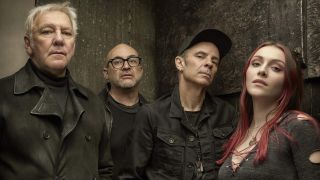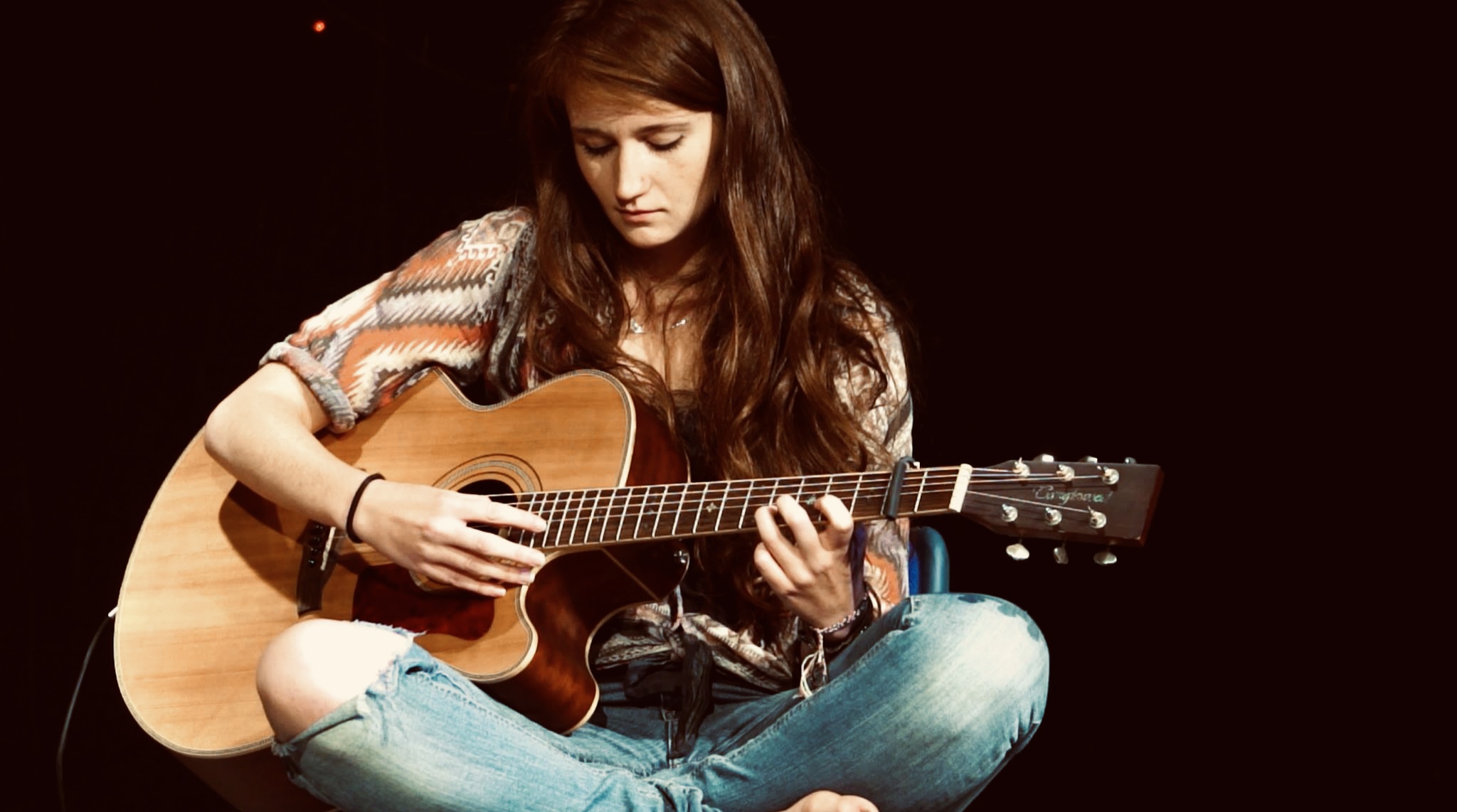Alex Lifeson is no stranger to the concept of evolution, having dedicated four decades of his life to taking rock music to progressive new heights with Rush. Now, with new project, Envy Of None, he describes how he’s “clearing the past of a lot of things in my life, and looking forward to the sparkly things on the horizon.” It’s his musical renaissance, if you will.
The band’s eponymous debut album, which will be released on April 8 via Kscope, also features Coney Hatch bassist Andy Curran, producer/engineer Alfio “Alf” Annibalini, and young singer-songwriter Maiah Wynne. Crucial to the band’s haunting and intensely melodic character, Wynne has become something of a muse for Lifeson - and by his own admission – she’s what truly brought the music to life, and turned this project into a serious prospect.
Full of surprises, the record twists and turns through various shades of alternative, experimental and art rock, with layers-upon-layers of atmospheric guitars and enchanting vocals that weave in and out of each other with serpentine fluency.
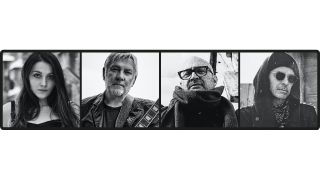
The two singles released so far - ‘Liar’ and ‘Look Inside’ - bear more sonic resemblance to Nine Inch Nails, Massive Attack or even Billie Eilish than anything either Lifeson or Wynne have ever been known for - and it’s clear that there’s a shared delight in this for both of them.
Elsewhere, the album delivers everything from industrial heaviness with tracks like ‘Enemy’, to the delicate poignancy of instrumental album closer, ‘Western Sunset’ - a tribute to Lifeson’s friend and former Rush bandmate, Neil Peart.
We caught up with the pair to discuss their unlikely musical partnership, their collaborative “back and forth” approach to songwriting, backwards banjo playing, and what might lie ahead for a band that’s sure to be able to pull in fans from across genres and generations.
This project has been cooking for a few years, and the circumstances of how it all came together are really interesting. Could you both tell us a little bit about how you got involved?
Alex: "Andy got in touch with me about five or six years ago. He was working on some musical ideas and we have a long relationship. We were bandmates on the same label and then he worked at our office for about 15 years.
"So he just sent me some stuff, and very casually, I just threw some guitars on just as a reference for him. That’s all that he really wanted - there was no talk about a project or continuing.
"A few months later he’d send another bit, and a piece here and there, and we just casually carried on that way until Maiah came into the picture. Then it took on a much more serious tone."
Maiah: "Yeah, I got into contact with Andy through a song contest I won, and I had a mentorship Zoom call with him, and we started talking about music. He mentioned some stuff he’d been working on and I offered to add vocals if he needed any.
"He took me up on the offer. It was a really great opportunity. We started off on just a couple of tracks. He sent me a lot of music he had been working on that didn’t have any lyrics yet, and the first one I chose was ‘Shadow’.
"He sent me just a couple of little words and things and then just this empty music track, and I added lyrics and vocal melodies and sent it back. It was such a fun process.
"Then after a month or two, he called me one day and said, “I’ve showed these to my buddy Alex, and he wants to add some guitars to this.” And I guess the rest is history."
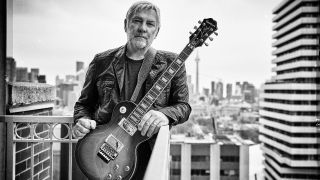
One of the things that’s striking about the record is that it has this totally cohesive sound and vibe - so much so that you could be forgiven for thinking you all grew up in the same neighbourhood, in the same scene, listening to the same bands. Do you share much in the way of musical influences, or to what do you attribute this musical connection?
Alex: "I don’t know. It’s quite unique actually, because there’s quite a gulf between our ages and the type of music we grew up with. I’m not a big modern music listener, and I don’t follow music in the way I once did, but I’m just a natural musician, so I’m always hearing music in my head.
"So when we worked on this project, I just heard so much, and I was quite inspired by Maiah’s approach to her vocals, primarily. The melodic content of her vocals was inspiring to me as a guitarist to work with and around.
"Part of it, I think, is that we really respect each other. No one is any different from any one else in terms of this project. There is a sort of spongy cohesiveness about the production on the record - it sounds like all these songs are from the same record and by the same people.
"It has that intact unity that’s maybe lacking in some modern music because there’s so much focus on the single and single release. It seems like the album concept is dying out, and I think we really captured it on this record."
How would each of you sum-up the sound of Envy Of None?
Maiah: "I would say it’s an interesting mixture of soothing, haunting and gritty."
Alex: "I would also add: atmospheric and poignant."
It’s quite a span of moods…
Alex: "It’s true and releasing these singles - you know, we put ‘Liar’ out a month ago and ‘Look Inside’ is out now - and talking to people who’ve listened to those two songs, they’ve already got an idea of what the whole album’s like.
"So we’re so excited about the release of the album. We really can’t wait for the album to come out so people can really hear the diversity. There’s so much of it - from pop, to industrial, to country - it covers everything and yet, it’s all connected."
Alex, it’s quite a stylistic shift for you. Has this project changed your approach to composition?
Alex: "I think I’ve always been this guitar player. That’s the way I hear music, and it’s what charges me: atmospheric sound-scaping, all these things. It was great for me.
"Alf played some great guitar on the record so I could explore other areas that were maybe a little more out of the left field that weren't necessarily guitar-centric. But I used the instrument to create tones, moods and colouring, and that’s a challenge that I just love.
"It’s exciting for me, it’s extremely creative and it’s got a little bit of science mixed in."
When you released ‘Kabul Blues’ & ‘Spy House’ as instrumentals to go along with the launch of your signature Epiphone Les Paul Axcess, was the plan always for Maiah to come in and do vocals?
Alex: "I think the plan for me was always to hopefully release those songs in whatever form they would transform into and once they became part of Envy of None, it was a natural progression to have Maiah work on those songs as well. She did an amazing job, lyrically and vocally, particularly on ‘Kabul Blues’."

Maiah - what has it been like working in a band environment and adding to pre-existing material, considering you work primarily as a solo artist?
Maiah: "It’s been really fun. It’s a great challenge to write music in such a different way. I’m so used to picking up an instrument and doing whatever comes to mind, whereas, with this, there’s different kinds of parameters, and it’s a new genre that I don’t normally get to play in.
"It’s so wonderful to get tracks that are already fully-fledged in some situations. There’s so much happening with the bass and the guitars that Alf did, and such an energy already imbued in these tracks when I get them, so it’s nice to have that as a launching point when I’m adding vocals and lyrics.
"Then hearing it grow - I’ll send things and then getting to hear what Alex adds to that - is one of my favourite parts because I never know what he’s going to do, and it’s normally that’s so textural and adds so much depth to the song. Really, it’s a very satisfying process for me and I’ve really enjoyed it."
Was all of the record made by sending files back and forth, or did you get to get together in a studio?
Alex: "It was all files sent back and forth, and back and forth, and back and forth! Maiah and I developed a pretty close relationship in our songwriting, and I’d often wait for at least a scratch vocal from her so I could get a sense of what her direction would be. So I would work around what she’d created, and I got really a lot of input from her performance.
"Then, in turn, it would follow that path back to her and she would update her vocals with stuff that she was picking up from the guitar arrangement. Then, it would come back eventually to me, and I would tweak some other little thing.
"So it was a real back and forth to reach the apex of this particular pyramid that we created for each of these songs. It was a really rewarding writing experience, and, coming from two different places in time, it was really remarkable and interesting to me how we connected on this very similar thread of music and the way we hear music. We’re a lot alike in that way."
Alex, you were of course in a band that spanned almost your entire career, until the sad loss of Neil Peart. What’s it been like working on something entirely new, with new people?
"Well, the Rush tour ended in 2015, and that’s when we sort of called it quits. Neil became ill about a year later, and fought that battle three and a half years. So for me, the realisation that it was over was not easy.
"Both Geddy and I felt we still had a lot of gas in the tank and we could have continued but Neil was exhausted, and with the way he played, it wasn’t surprising. And he wouldn’t settle for 1% less in his performance. So it all made sense, and after 41 years, who could argue that we’d earned it?
"But I have to say, and I think this is a common thing with people who reach their retirement, that you look for things to do that are as exciting and as challenging as the thing that you did for all of those decades.
"Certainly golf is not one of those, and you know, you still need to be driven. You still need to have the desire, motivation and enthusiasm to do whatever it is that’s going to light your fire. I came to realise, with this project - especially in the last year where we’ve really focused on it - for me, it was a life saver. It was a kind of renaissance for me.
"I got back into playing on a much more regular basis, I looked forward to the songwriting, I really wanted to do my very best and be innovative with what I was doing.
"All of those things that relit my reason for living happened, and now I’m clearing the past of a lot of things in my life, and I’m looking forward to the sparkly things on the horizon that are catching my interest. This has definitely been the key for me."
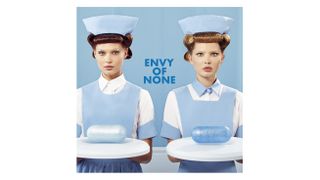
You are both very accomplished multi-instrumentalists - what did each of you play on this record?
Maiah: "I have actually very much enjoyed that on this record, I didn’t really play much of anything. I did do a keyboard track that I put through a guitar amp for ‘Shadow’, but other than that, I mostly used my voice as an instrument in these tracks, and did a lot of layers: a lot of harmony layers, and background vocal layers - too many layers! But Alex did a lot on these tracks."
Alex: "Just to add to what Maiah was just saying about her contribution: it’s not just her voice. When she did her vocal tracks and submitted them - because we’re sharing all these files - what you’d expect from a vocalist is that maybe there'd be the main vocal track, a double track and maybe a couple of harmony tracks.
"We would receive sixteen to twenty tracks of vocals, and all of those essential things were there, but also all of these other, really cool, great bits of vocalisations that were just so exciting to listen to and so inspiring.
"When she says she used her voice as an instrument, she used her voice as many instruments! It was really, really great, and a lot of the reason these songs sound the way they sound.
"For me, you can see I’ve got all these guitars back here, and I’ve got a violin, mandolins, and my banjo. I think, because I’ve been playing a stringed instrument since I was twelve years old, I feel comfortable with them and I can figure them out if I don’t really have any training on that particular instrument.
"It’s really cool to bring an instrument like a banjo and record it backwards, and put it through effects and make it sound like this other-worldly instrument that you really can’t put your finger on. You know it’s not a synth or a keyboard, but you just can’t identify it, and that camouflaging is really cool to me."
There are a lot of interesting treatments and effects on the record, like the backwards banjo and guitar. Could you tell us about some of the gear you used and how it all feeds into your creative process?
Alex: "Generally I don’t use any of what you would call stompboxes or external effects. I do record everything analogue. I go through all my preamps and compression and amps and speakers.
"So everything is analogue before it goes into the digital domain, and I think that it’s just one step closer to incorporating the dynamics that you’re looking for in a recording. The plugins are great - they’re handy and convenient - but they sound like you’ve pasted it onto the screen, and it’s very difficult to manipulate it enough to make it sound like it has depth.
"Whereas when you record a guitar through an amp, on a speaker, with its microphone, immediately you can hear the dimensions. So, for me, once the recording was done, then I would manipulate it with plugins and effects that way.
"The backwards stuff, I’ve been doing for a long time. I think what I cued-in on this time was: if I wanted to do something backwards that was going to follow a vocal line, for example, I’d flip that vocal, play to that vocal line and then flip what I’d just played and put the vocal back. I found that I could follow the melody line better, and there was a better sync between what the vocal line was.
"If you take ‘Old Strings’ for example: at the start of the second verse, there’s a backwards guitar that just kind of weaves around the vocal delivery. And for me, honestly, in this whole album, that is maybe the highest point.
"There’s something about it - every time I hear it, my eyes get all watery and I get goosebumps, and it’s just the play between those two elements: the vocal and that backwards guitar.
"That whole song has this dance that Maiah and I do, and I tried to reflect what I was playing emotionally and what she was singing about, and the way she was delivering those lyrics. I tried to get a sense of what the emotional waves were, and follow that.
It's a great example of the way we work together, and it’s probably one of the most beautiful songs I think I’ve ever heard. I feel blessed to have been able to play on it because it will go on for the rest of my life as one of the best things I’ve ever done."
And Maiah, which moments or tracks on the record are you particularly proud of and why?
Maiah: "I mean, I agree with that moment on ‘Old Strings,’ and that was particularly satisfying for me because that was the one song on the main record that I wrote. So it was really satisfying and fulfilling to hear it in this way and what Alex did on guitar was so beautiful. It’s just such a fulfilling piece of music to have worked on.
"But also, I love each song for different reasons, and I sort of challenged myself in different ways on each track. ‘Enemy’ was sort of the first time I let myself let loose a little bit vocally, and got a little bit more raw and passionate, and I love that song for that reason. It helped me get out of that state of quietness a little.
"There’s so many tracks I’m very proud of for different reasons. These guys have done such amazing work - Andy and Alf created such amazing bed tracks, and everything that Alex has been up to, and the songs that he wrote - it’s such a beautiful and satisfying project to be a part of.
It’s so wonderful to be at the end of it and to get to just hear it all after five years of working on it."
You say “the end of it”, but do you think it’s something we’ll get to see on stage?
Maiah: "We’re kind of waiting to see."
Alex: "Yeah. It’s a little premature. I think until the album comes out, we don’t really know what the demand is, but we’re open, I think."
With all the layers and textures you’ve created, is there anything you think could be challenging to recreate if you do head out to a live environment?
Alex: "Not really because if we were putting something together for a live show, we would have other players. We would definitely make sure that this record live sounds like it sounds.
"Personally, I think it would be amazing. The material itself and the way to present it, particularly in a small theatre with a great light show - with Maiah out front and great musicians in the background - it’d be stunning."
Envy Of None by Envy Of None is released 8 April. It's available on CD and vinyl here
